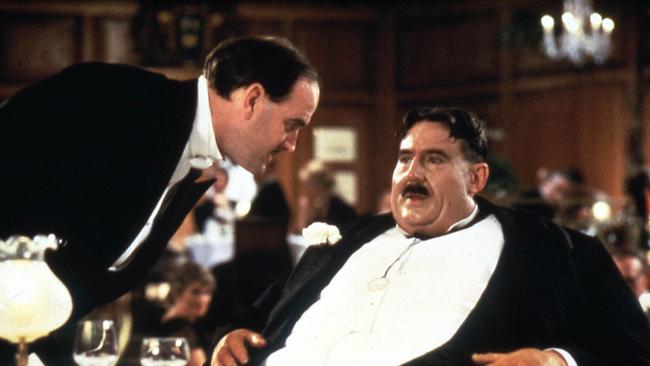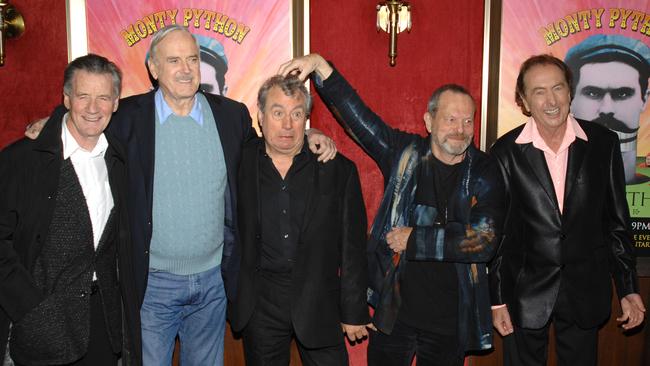‘Gentle Python’ Terry Jones a giant of comedy
The members of Monty Python’s Flying Circus were known as ‘the Beatles of comedy’. They could never really leave the group.

The members of Monty Python’s Flying Circus were known as “the Beatles of comedy” and just like the Fab Four they could never really leave the group, even when it was disbanded.
Terry Jones was always described as “ex-Python Terry Jones”, in the same way that Paul McCartney has always been “ex-Beatle Paul McCartney”, despite both of them going on to have successful solo careers.
Jones, who became a film director, author and historian specialising in the Middle Ages, never minded being labelled this way. He was as affable off screen as on, and such was his modesty he declined to have a blue plaque put up outside the house in Colwyn Bay, north Wales, where he was raised.
Yet a blue plaque would have been appropriate, given that he helped to revolutionise British comedy not only by writing some of the most memorable Python sketches, in partnership with Michael Palin, but also playing some of the funniest characters, ranging from a naked organist and a straitlaced city gent, to a series of gloriously dowdy, screechy-voiced old crones known collectively to the Python team as “pepperpots”. The waitress he played in the Spam sketch was one such.

He and Palin were considered the gentle Pythons. “Mike and I just wanted to be loved,” he once said of their output. John Cleese and Graham Chapman formed a second writing partnership within the group, one that was considered more dangerous and provocative, while Eric Idle tended to work on his own, writing the songs, and another Terry, Gilliam, handled the animation, including the giant cartoon foot that was wont to stamp with a splodge sound.
Jones showed early signs of wanting to expand beyond the confines of comic actor-writer when he co-directed Monty Python and the Holy Grail (1975) with Terry Gilliam. He also directed Life of Brian (1979), the team’s most acclaimed and controversial film, as well as The Meaning of Life (1983), their more hit-and-miss swansong in which, among many other roles, Jones played Mr Creosote, the obese diner who explodes after being tempted to eat a wafer-thin mint when he is already “absolutely stuffed”.
After the first break-up of the troupe in 1974 — Cleese took on the McCartney role and was the first to officially walk out — Jones initially shied away from acting. His subsequent profile would in consequence never be as high as that of Cleese, who made Fawlty Towers, or Palin, who became the doyen of the travel program. He did, however, enjoy a successful career as a film director, popular historian and author of books for children and adults. He was also a staunch opponent of the invasion of Iraq in 2003, a subject about which he wrote numerous anguished newspaper articles suggesting, among other things, that George W. Bush and Tony Blair had been lobotomised.
The critic and writer George Perry said Jones could speak eruditely on any subject from fossil fuels to Rupert the Bear, mediaeval mercenaries to modern China.
One feature that perhaps typified his gallery of Python characters more than any other was their cheeriness, no matter how ridiculous the situation, that and his voice — the way he pronounced his Rs as Ws in a distinctive croak. There was always a chuckle just below his surface and, combined with his distracted air, this made him seem like an absent-minded don who couldn’t remember where his next lecture was supposed to be.
Terence Graham Parry Jones was born in 1942 in Colwyn Bay, where his father, Alick, worked for a bank. The family moved to Surrey when Jones was young, though he remained proud of his Welsh roots. He excelled academically and at just about everything else he tried. Head boy at the Royal Grammar School in Guildford, he also captained the rugby and boxing teams, though he had no opportunity to act because at his school, he reckoned, “drama was a synonym for homosexuality and all that is bestial in human nature”.
His relationship with his father was distant. “I remember seeing him for the first time when I was 4½. I’d only seen photographs of him before then because he had been based in India during the war, in the postal service. I grew up with women doting on me — my mother and grandmother — and when my father came back he wanted to impose some strict Edwardian values. I suppose I resented the intrusion.”

His earliest ambition was to be a poet, to which end he studied English at Oxford University. While there he also worked on Isis, the university magazine, and performed in Brecht plays as a member of the Experimental Theatre Club. As a break from serious drama, the club also did an annual revue, for which Jones — inspired in part by listening to Peter Sellers and Spike Milligan performing on the radio in The Goon Show — wrote material with another undergraduate, Palin.
Their Oxford revues attracted impressive audiences and played at the Edinburgh festival and on the West End. For their final show they moved away from satirical material to the more zany and surreal style of comedy that would characterise Python.
Jones graduated in 1964, Palin in 1965, and they subsequently wrote for, and occasionally appeared in, several television comedy and satire programs, including The Frost Report, Do Not Adjust Your Set and The Complete and Utter History of Britain, which featured television interviews at the Battle of Hastings, an anachronism that would become a favoured device of the Pythons.
The “Oxford men”, Palin and Jones, soon came into contact with the “Cambridge men”, those Footlights stalwarts Chapman, Cleese and Idle. Jones was developing a new show with Palin, Idle and Gilliam when Palin was approached by Cleese, with an invitation to join him and Chapman on an entirely different program. The upshot was that all six joined forces, as writers and actors, and Monty Python’s Flying Circus was born.
It was first broadcast in 1969 and was soon pushing the boundaries of acceptability both in terms of content — including nudity, live and animated — and style. Jones advocated a stream-of-consciousness approach. He favoured sketches that simply ended when performers walked off without delivering a punchline. Cleese preferred a more structured approach and a creative tension began to emerge between them. One compromise was found in the form of Cleese’s serious-looking presenter announcing: “And now for something completely different.”
The show first became popular on university campuses and then quickly grew into a full-blown phenomenon, with books, records and “concert” tours, which included playing at the Hollywood Bowl. The word “Pythonesque” was given an entry in the Oxford English Dictionary. In his offbeat way, Jones took this accolade as a sign of failure because “we wanted to be unquantifiable”.
The Pythons also made four feature films. The first, And Now for Something Completely Different (1971), simply reworked some of the TV sketches. Monty Python and the Holy Grail, however, was a vaguely linear story that successfully married Arthurian legend and Pythonesque silliness, and played well to Jones’s sense of the absurd. In rehearsals, for example, they used halves of coconuts to create the clip-clop sound of horses’ hoofs and were so tickled by this they kept them in. Jones later claimed to feel guilty about perpetuating the myth that everyone in medieval England had blackened teeth. “It was before the opening of the sugar trade with the West Indies,” he said, drawing on his expertise in this period, “so, actually, people had very good teeth.”
Jones’s co-director was Gilliam, and this arrangement did not always work out as smoothly as both parties hoped it might. On the two subsequent (and more polished) Python films, Jones had sole director credit.

Life of Brian was banned in Ireland and parts of Britain and, to Jones’s chagrin, it was initially dismissed as just another in a long line of films designed to cash in on the popularity of British television comedy shows. Eventually it was acknowledged as “the greatest comedy film ever” in a Channel 4 poll in 2005. “The thing to remember about Life of Brian is that it wasn’t blasphemous, it was heretical,” Jones once said. “There is a difference.”
In the film the central character of Brian is born in the stable next to Jesus and is thereafter repeatedly mistaken for him. It was a satire on religious cults and false prophets, though some cinemagoers fell into the same trap as the characters on screen and confused Brian with Christ, leading to the conclusion that the film was belittling Christ. One of the scene-stealing characters Jones plays in the film is Brian’s mother. “He’s not the Messiah,” she screeches at the multitude. “He’s a very naughty boy.”
“It’s the whole history of the church in five minutes,” Jones once said. “You find somebody to believe in and then within five minutes everyone splits up into factions, and they end up killing each other because they can’t agree on what he meant.”
Continuing his working relationship with Palin, Jones co-wrote Ripping Yarns (1976-79).
Although Jones did not give up acting altogether, he concentrated his efforts behind the camera, writing the screenplay for the David Bowie fantasy film Labyrinth (1986) and directing Personal Services (1987), a comedy-drama about a suburban brothel.
Erik the Viking (1987), starring Tim Robbins, Mickey Rooney and Cleese, was an ambitious adaptation of Jones’s award-winning children’s book. He wrote and directed the film, but it was a commercial disappointment. He directed an adaptation of The Wind in the Willows (1996), in which he played Toad.
His books aimed at a more adult audience included Who Murdered Chaucer? A Medieval Mystery (2003). He also wrote and presented the TV history series Crusades (1995), Ancient Inventions (1998) and Medieval Lives (2004).
In 2014 the Pythons re-formed for Monty Python Live (Mostly): One Down, Five to Go, a sellout show (in every sense) at the O2 that was prompted by legal bills of close to a million, after they lost a case over royalties for the musical adaptation Spamalot. The acclaim was (mostly) universal.
In later years Jones described himself as a “quasi-academic” and said what he liked most in life was “laughing” and “silly things”.
In 1970 he married Alison Telfer, a biochemist, and they had two children. Although the couple had what amounted to an open marriage — Jones once said his hobby was sex — they divorced after he confessed he had fallen in love with Anna Soderstrom, a Swedish Oxford graduate 41 years his junior. They had a daughter when Jones was 69 and married in 2012.
In 2016 “ex-Python Terry Jones” was diagnosed with a rare form of frontotemporal dementia and bowed out of public life with an outstanding contribution BAFTA, which his son, Billy, who was standing with him, accepted on his behalf. It was presented to him by one of his oldest friends, “ex-Python Michael Palin”.
THE TIMES

To join the conversation, please log in. Don't have an account? Register
Join the conversation, you are commenting as Logout